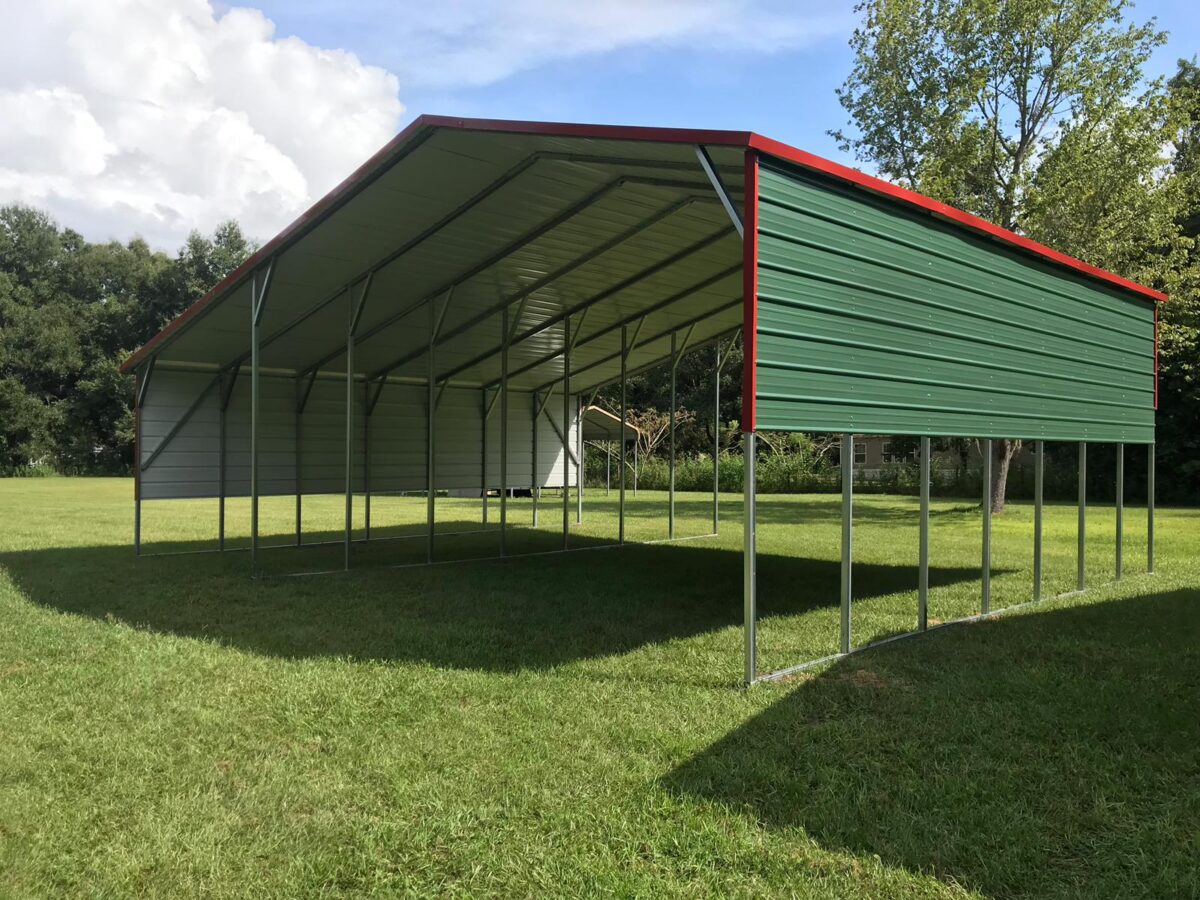Introduction
When it comes to protecting your vehicle or outdoor equipment, choosing the right carport material is crucial. Carports provide essential shelter, shielding assets from harsh weather, UV exposure, and debris. While wood and metal carports are both popular options, one clearly stands out in terms of cost, durability, and maintenance.
Metal carports offer superior affordability, longevity, and ease of installation, making them the smarter investment for homeowners and businesses alike. In this article, we will explore the advantages of metal over wood carports, examining their durability, cost-effectiveness, maintenance requirements, and assembly process.
1. Durability Comparison
Metal Carports: Built to Last
Metal carports, especially those made from galvanized steel, are highly resistant to weather conditions such as high winds, heavy snowfall, and rain. Unlike wood, metal does not warp, crack, or deteriorate over time due to moisture exposure. Additionally, metal carports are:
- Fire-resistant: Unlike wood, which is highly flammable, metal offers superior protection against fire hazards.
- Pest-resistant: Termites, carpenter ants, and other wood-boring pests can significantly damage wooden structures. Metal carports eliminate this risk entirely.
- Rust-resistant: With protective coatings, modern metal carports resist corrosion and maintain their structural integrity for decades.
Wooden Carports: Susceptible to Damage
While wooden carports can provide an aesthetic appeal, they come with a host of vulnerabilities:
- Exposure to moisture leads to warping, rotting, and eventual structural weakening.
- They require regular treatment to prevent pest infestations and decay.
- High maintenance is necessary to ensure longevity, making wood a less durable option in the long run.
2. Cost-Effectiveness Analysis
Initial Costs and Long-Term Savings
The upfront cost of building a wooden carport is often higher than that of a metal carport due to expensive raw materials and labor-intensive construction. Metal carports, particularly prefabricated models, offer significant savings:
- Lower material costs: Prefabricated metal components are mass-produced, reducing manufacturing expenses.
- Minimal waste: Metal carports are cut to precise measurements, eliminating excess material waste.
- Recyclability: Leftover metal can be reused or sold as scrap, further offsetting costs.
Long-Term Financial Benefits
Wooden carports require frequent upkeep, including repainting, staining, and structural repairs. In contrast, metal carports boast:
- Longer lifespan: Metal structures remain intact for decades with little intervention.
- Reduced repair costs: Unlike wood, which deteriorates over time, metal requires minimal maintenance, leading to lower ownership costs.
3. Maintenance Requirements Overview

Metal Carports: Low-Maintenance Investment
One of the biggest advantages of metal carports is their low-maintenance nature:
- No need for repainting or refinishing.
- Resistant to mold, mildew, and insect infestations.
- Simple cleaning requirements—just a rinse with a hose and occasional check-ups.
Wooden Carports: High Maintenance and Costly Upkeep
In contrast, wooden carports demand considerable effort and expense to remain functional:
- Require frequent sealing, staining, or painting to prevent weather damage.
- Vulnerable to rotting and warping, leading to costly repairs.
- Susceptible to insect damage, requiring regular pest treatments.
4. Assembly Process Comparison
Quick and Easy Metal Carport Installation
Metal carports are designed for hassle-free installation, whether by professionals or DIY enthusiasts. Their advantages include:
- Prefabricated kits: Components come pre-cut and ready to assemble with simple nuts and bolts.
- Minimal labor requirements: Unlike wood, which requires sawing, measuring, and nailing, metal carports use easy-to-assemble fasteners.
- Fast completion time: Metal carports can be installed in a fraction of the time compared to wooden structures.
Wooden Carports: Lengthy and Labor-Intensive
Building a wooden carport is a much more complex process:
- Requires precise cutting, hammering, and assembly, often needing professional assistance.
- Takes longer to construct, increasing labor costs.
- Heavy materials and detailed craftsmanship make the process more time-consuming and expensive.
Conclusion & Final Recommendation
When weighing the pros and cons of wood vs. metal carports, the benefits of metal are clear. Metal carports outshine wooden ones in terms of durability, affordability, low maintenance, and quick assembly. They offer superior resistance to weather, pests, and fire, all while keeping long-term costs down.
For those looking for a cost-effective, hassle-free, and long-lasting solution for vehicle or equipment protection, metal carports are the smartest investment. To explore high-quality metal carport options, visit Carport Solution today!
